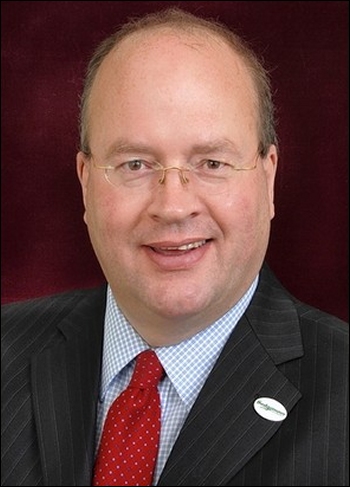A decision to give the boss of Sedgemoor District Council a second job and increase his salary from £115,000 to a reported £139,000 came under scrutiny at a special meeting on Friday (February 19th).
Sedgemoor District Council’s Corporate Scrutiny Committee looked at the decision to make Chief Executive Kerry Rickards also responsible for the council’s 4,200 properties – and thereby add the salary for that role to his pay.
The additional role at Homes in Sedgemoor has given Mr Rickards, pictured, a 20 per cent pay rise.
Councillor Brian Smedley, who chairs the Corporate Scrutiny Committee, said: “The new figure is more than cabinet ministers and almost equates to the Prime Minister on £142,000.”
But Mr Rickards, aged 59, who has been Chief Executive for 15 years, has defended the move, saying it saves money as Sedgemoor is now employing one person to do two jobs.
Council spokeswoman Claire Faun told Burnham-On-Sea.com after Friday’s meeting: “After two hours’ evidence and debate and questions, the Committee agreed that all policies and procedures were followed correctly in an open and transparent manner.”
At Friday’s meeting, which was attended by five members of the public, there were three main lines of enquiry addressed – the background to the decision being taken to remunerate the Chief Executive for fulfilling the role of Chief Executive of Homes in Sedgemoor; the basis for the level of remuneration given; and the justification for the decision in value-for-money terms.
The attendees who were ‘giving evidence’ included Kerry Rickards and also the original decision-makers – Cllr Duncan McGinty, Leader of Council; Cllr Mrs Dawn Hill, Deputy Leader of Council; Cllr Mick Lerry, Leader of the Labour Group.
Council leader explained the decision
Council Leader Duncan McGinty explained the process that led to him accepting this was the right one. He explained that “the root cause stemmed from problems with Homes In Sedgemoor which had been set up in 2007. They had a responsibility to 65 members of staff, 4,200 tenants and had to manage a £14m turnover. In June 2015 there was a crisis following a vote of no confidence and a spate of resignations.” He had invited the Chief Executive to step in to find a solution. “This was achieved by forming a new top team from SDC staff and managing a restructuring which saved almost £300,000. Since the new management had been introduced, the performance was a lot better.”
When it came to explaining the salary, he was “aware that the Chief Exec hadn’t had a pay rise since 2009 and that if he had received 2% a year that would have been £126,000.” He further compared the SDC Chief Exec’s salary with other Chief Executives which ranged from £80,000 to £350,000 and said that he was “on the lower side”.
He said it “wasn’t fair to compare Mr Rickards salary with the Prime Minister who gets three houses and £128,000 in expenses on top of his salary.” He also stressed “the additional responsibilities that the Chief Executives role brings, not least being the landlord of 4,200 properties.” He added that it wasn’t uncommon for the role of Chief Executive to be shared across organisations and cited the Principal of Bridgwater College who also had to manage Cannington, West Somerset and SCAT. In conclusion he described the Chief Executive as providing “inspirational leadership” with the results “speaking for themselves.”
Since 2006, Homes In Sedgemoor has employed five Chief Executives and in June 2015 a Vote of No Confidence was passed from the Sedgemoor Tenant’s Voice in senior officers and Board Members, as we reported here.
 Cllr Mick Lerry, leader of the Labour Group, concurred with much of what the Tory leader said and explained his own rationale for supporting the decision.
Cllr Mick Lerry, leader of the Labour Group, concurred with much of what the Tory leader said and explained his own rationale for supporting the decision.
“I asked whether the HR policies had been followed and whether the Union had been consulted and I was assured this was the case,” he said.”
“I further noted that the proposed solution did bring savings and protected services, particularly in the face of the Government’s 1% cut or reduction in the rent which leads to a loss of income of £6.5 million for the next four years. I was also concerned at the context of the decision which included possible moves to joint working with other authorities including places like South Somerset where they were operating without a Chief Executive, in Mendip where they outsourced one, or in South Devon where two districts shared one. I concluded that this new arrangement was indeed value for money for Homes in Sedgemoor but I’m not so sure if it was for Sedgemoor District Council. I can’t say what affect this has on staff morale because high pay rises never go down well with the public, but I believe there’s an acceptance that this is a huge saving.”
Council chief defends the pay
Mr Rickards told the meeting he is “happy to be here as his pay was already in the public realm and nothing was secret. Sedgemoor’s performance since 2000 shows how great it is here.”
He added: “It’s not down to one individual but to a fine team. We’ve improved in every area and I challenge anyone to find an area in which we haven’t. We are in the top 10% of Local Authorities and have £11-12m of reserves. Being Chief Exec of Homes In Sedgemoor isn’t an easy job. If it was they wouldn’t have gone through five in nine years. There are staggering levels of responsibilities. There was an £80m deficit and they needed someone to step forward.”
“My background was in housing and in Walsall I was the principal finance officer looking after a stock of 80,000 homes.. That’s why the Leader asked me to take over and without meaning to blow my own trumpet we are delivering a damn good service.”
“The plain fact is Homes In Sedgemoor couldn’t afford another Chief Executive on the salary they were on. In terms of consultation, every report goes to the Union and any comments can be forwarded to the Exec. But there were no comments because it made absolute sense.”
Local councillors speak out at meeting
Cllr Mike Facey (Con, Burnham North) said: “I believe we have a good leader, a professional Chief Executive and good staff. I say carry on.”
Cllr Bob Filmer (Con, Brent Knoll) said: “It seems to me that in addressing the key lines of enquiry we should recognise that the Panel have followed the correct procedures and the due process.”
The meeting heard that the Chief Executive of SDC was asked to take appropriate action last year and a new top team was appointed, with a new structure. 14 posts were deleted and eight posts were revised with remuneration uplifted. Six posts were created and this, it was claimed, led to a net salary saving of £279,140.
Friday’s meeting also heard there had been an overall reduction in Homes in Sedgemoor management fees of £750,000. The performance of Homes in Sedgemoor since July 2015 has seen ‘non-decent homes’ go from 14% to 10%, while rent collected as a percentage of rent due has gone from 94% to 99%. And the average number of days to complete repairs has gone from 16 to 13, it was claimed.
With regards to the performance of the Chief Executive of SDC, the meeting heard that staff numbers in 2000 were 870 and are now 356. Net inward investment since 2000 has been £1.25 billion (with £650 million for housing and £600 million for business investment). It was stated at the meeting that Sedgemoor is one of the lowest cost authorities in the whole country.
The Chief Executive’s salary in 2010/11 was £110,235 and in 2015/16 is £132,282, with no pay rise since April 1st, 2009. If the Chief Executive had received a 2% pay rise for each of the seven years, the gross salary would be £126,625 salary of previous Homes In Sedgemoor Chief Executive – £90,000 plus £10,000 car allowance.
Looking at comparative Chief Executive salaries, the meeting heard that most ALMO Chief Executives tend to range from £90,000 to £120,000. The Housing Association Chief Executive ranges from £80,000 to £350,000, according to the National Federation of ALMOs. Average District Council Chief Executive Salaries range from £63,000 – £203,000 per annum, according to Parliament.co.uk, Local Government CX Remuneration 2012-13.
In answering how the the uplifts in salary were determined, the meeting was told that Homes in Sedgemoor, in seeking to significantly reduce the senior management costs within the Homes in Sedgemoor management fee, approved the deletion of the following posts from the Homes in Sedgemoor establishment, with effect from 31st March 2016 – Chief Executive post, Director of Asset Management, Community and Governance Manager post and one other.
The meeting heard: “The restructure assigned additional responsibility for certain Homes in Sedgemoor functions to existing posts within Sedgemoor District Council. The responsibility for Chief Executive duties for Homes in Sedgemoor have been assigned to the post of Chief Executive for the Council and the Group Manager: Legal & Procurement has been assigned responsibilities for the Company Secretarial function for Homes in Sedgemoor, along with deputising responsibilities for the Company Secretarial functions being assigned to the Council’s Legal Services Manager.”
“Clearly if the Council employees, to whom these responsibilities have been assigned, did not agree to take them on in addition to their existing roles, Homes in Sedgemoor would have no option but to appoint someone else at significantly greater cost,” the council spokeswoman added.
Regarding salary uplifts, “In accordance with minute no 81 of the Executive held on the 18th November 2015 the Leader, Deputy Leader and Leader of the Opposition met on the 14th December 2015 and with the benefit of financial advice and reference to the Staff Recognition and Honoraria Scheme, determined the amounts payable as detailed here: Joint Chief Executive – 20% with effect from 14th September 2015.”
Three key questions were asked regarding the pay of Mr Rickards, as follows:
Is it acceptable that the Chief Executive gets paid almost as much as the Prime Minister?
The meeting was told: “As reported on the Independent Parliamentary Standards Authority (IPSA) website, the Prime Minister’s salary is £142,000 (annual, including £67,060 MP’s salary).”
“In addition to his salary the Prime Minister benefits from the following – the use of three homes (10 or 11 Downing Street, Chequers, a Country House in Buckinghamshire and a £1m Constituency home in the Cotswolds). Expenses to cover staff, travel, equipment, hotels and communications. In 2014 -15 this amounted to in excess of £128,000.”
“The Chief Executive’s salary is comparable with Chief Executives of similar sized Local Authorities, with similar levels of responsibility for two organisations. Furthermore, by taking on the additional role of Chief Executive of the ALMO a significant saving has been made due to the removal of the ALMO Chief Executive post, which was formerly paid at £90,000 pa + £10,000 car allowance.”
When the Chief Executive was appointed in 2000 he had responsibility for Operational Housing at that time. When the ALMO was created in 2006, he did not take a pay cut. Why is it acceptable that he now gets a pay rise for resuming responsibility for Operational Housing?
“Despite the ALMO being created in 2006 (shadow form) the responsibility for Sedgemoor’s housing stock (the Landlord function) was always retained by Sedgemoor District Council. When the ALMO was created the decision was taken to dispense with the Director of Housing post within the Council, as this role would be carried out by the ALMO. The pay rise given to the Chief Executive is fair and is in recognition of the additional duties and responsibilities associated with leading two separate Organisations.”
How did the Chief Executive find capacity to take on this additional role, was his time not fully occupied before?
The council quoted an Investors in People Assessor, Clive Tabbiner, with his assessment of Sedgemoor District Council: “There is clear evidence at Sedgemoor District Council that the Chief Executive employs an approach of ‘Inspirational Leadership.’ The Chief Executive has a strong team of experienced Officers in both Sedgemoor District Council and Homes in Sedgemoor which allows him to oversee and lead on the many priorities and responsibilities which come with being the Chief Executive of two organisations.”
After the meeting, Cllr Smedley said: “Getting this issue to Scrutiny was very important. Members and the Public have a right to know what’s being decided in their name and why. Today we went far beyond that and into the minds of the decision makers at great length and in great detail. They’ve clearly and honestly answered the questions , and explained the choices they made as they saw them in the public interest. That’s what elected representatives have to do. And that’s the value of a scrutiny committee and of an open democracy. People can make these decisions – but we’re watching them.”







